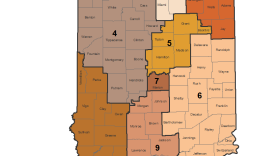Indiana and the city of South Bend are wading into a redistricting case set for oral arguments at the U.S. Supreme Court on Tuesday.
The justices will decide whether states can draw legislative districts based on the number of registered voters, rather than the total population. Two Texans are suing their state government, arguing the principle of "one man, one vote" is diluted by counting people who can't vote.
Twenty-one states, including Indiana, filed a friend-of-the-court brief taking Texas's side. And South Bend is one of 19 cities and counties to file a brief of their own. South Bend Mayor Pete Buttigieg says the proposed change would give urban areas less of a voice, and notes
“We are responsible for the well-being of all of the people who are in our community,” Buttigieg says. “We do not check if somebody is a registered voter before we address a pothole in front of their house. We do not care whether somebody is a citizen in feeling our obligation to provide them with clean, safe drinking water.”
And Buttigieg says counting everyone makes it easier to ensure city services are parceled out equally. When South Bend had a limited budget for sidewalk repairs, the city earmarked equal amounts for each city council district.
“Effectively, what you’re doing is you’re giving some people an unequal access to that public resource that was divided among the council districts precisely because we are accustomed to assuming that our districts are pretty good shorthand for how to get an equal division of people," Buttigieg says.
The case wouldn't affect congressional maps. The Constitution specifies those districts must be based on total population.





